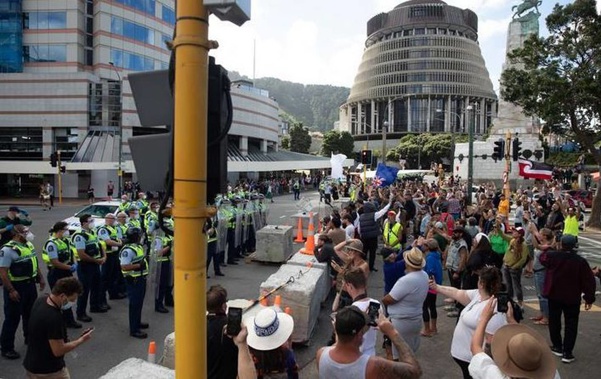
Various post-mortems have dissected Labour’s failures between 2020’s spectacular rise and this October’s sound defeat. However, the largest public uprising in a generation barely got a mention, with this recent piece from the UK’s Telegraph a rare exception.
There are two narratives that explain why protesters overtook Parliament’s grounds in February 2022. One is that lockdowns and mandates were necessary, but bad actors spread lies to convince the gullible that their government was against them.
The other is that the government’s policies lacked the ethical and scientific basis to justify that level of control over people’s lives, so the people worst affected and those close to them—who had actually experienced job losses or injuries—rebelled.
What influence did dreaded “right-wing extremists” really have? A poll of the protesters found that 30% had supported Labour in 2020. Both Greens and National supporters represented 16% each. Ethnically, 27% were Māori. And the most common motivation for protestors of all stripes was, in fact, opposition to vaccine mandates and support for the injured.
Labour effectively lost this election two years ago without any help from conspiracy theorists. Polls show that by early 2022, voters increasingly believed the country was heading in the wrong direction. Rather than change course, the government began consuming its own PR: Policies designed to create two classes were for our own good. And the policies weren’t causing real suffering; the discontent was founded on lies, which those who had elected the government wouldn’t be silly enough to believe.
The government stopped listening to anyone who didn’t support its narrative. Back in October 2021, bioethicist and former advisor Angela Ballantyne questioned the wisdom of policies that split us into vaccinated and unvaccinated.
“I think a major risk with the vaccine certificates or passports is that they are divisive,” she said on Q&A. “We, at all costs, want to avoid stigmatising certain sectors of New Zealand, pushing them further to the margins, labelling them as a threat for the rest of us.”
Five months later, as smoke wafted over Parliament, it appeared that she was right. Footage from the final day of the protest shows Rawinia Te Rito and another Māori elder seated in the kaumatua (host) tent. Around them, every other structure has been torn down or burned. Officers make awkward attempts to remove them but soon give up.
Rawinia, interviewed in “River of Freedom,” recalled how former Speaker of the House Trevor Mallard approached them next.
“Come inside for a cuppa,” he offered.
“Bring your cuppa here,” she replied.
“Hell, no!” Trevor said, laughing at the idea.
Then, she said, he walked off to survey the wreckage. He was still laughing.
The incoming government has a momentous task ahead, but the real test may have little to do with inflation or GDP. Many Kiwis are waiting to see if this government will listen to those with whom it disagrees, include those who have been left out, and work towards unity. The story of the 2023 election is simply this: a government that divides us will not stand.
Maryanne Spurdle is a researcher for Maxim Institute, an independent think tank working to promote the dignity of every person in New Zealand by standing for freedom, justice, compassion, and hope.
Take your Radio, Podcasts and Music with you









